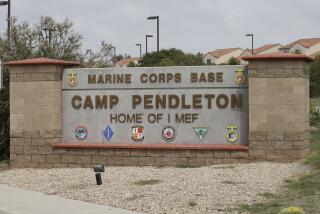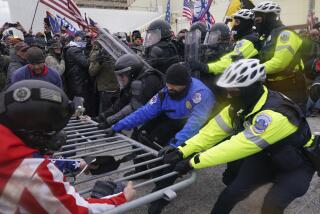Lawmakers Suspect Cover-Up by Senior Officers
- Share via
WASHINGTON — Two influential legislators who have been briefed on the U.S. military’s investigation into the deaths of 24 unarmed Iraqi civilians said Sunday that they suspected senior officers were involved in covering up evidence of war crimes by the Marine unit involved.
Neither lawmaker -- Sen. John W. Warner (R-Va.), chairman of the Senate Armed Services Committee, and Rep. John P. Murtha (D-Pa.), a former Marine and a leading authority on military issues -- said they had direct evidence of top officers trying to suppress information.
For the record:
12:00 a.m. May 31, 2006 For The Record
Los Angeles Times Wednesday May 31, 2006 Home Edition Main News Part A Page 2 National Desk 1 inches; 73 words Type of Material: Correction
Marines in Haditha: An article in Monday’s Section A about allegations that Marines had killed as many as 24 civilians in the Iraqi town of Haditha said Time magazine had quoted Human Rights Watch researcher John Sifton as saying a photo showed Iraqi civilians kneeling before they were shot. Sifton told The Times that he had not seen such a photo, and on Tuesday, Time magazine issued a correction of its initial report.
But both said the delay in launching a formal investigation into the incident in the western Iraqi town of Haditha led them to suspect that officers up the chain of command were complicit in attempting to keep the incident under wraps. They said they expected that congressional hearings on the killings would focus on the military’s reaction to evidence of an atrocity.
The killing of unarmed civilians, including women and children, occurred Nov. 19, but a formal investigation was not launched until reporters from Time magazine handed over video taken by an Iraqi journalist to military authorities in late January. A criminal inquiry was not begun until weeks later.
“It’s been six months since this happened,” Murtha, who was one of the first congressmen briefed on the incident by Marine officials, said Sunday on ABC’s “This Week.” “It’s very simple: They went out the next day, they knew there was something wrong. Two or three days later, they decided that these people were murdered....
“It goes right up the chain of command,” said Murtha, who has emerged as one of the most vocal critics of the Iraq war. “Who said: ‘We’re not going to publicize this thing. We’re not even going to investigate it’? Until March, there was no serious investigation. There was an investigation right afterward, but then it was stifled.”
On the same program, Warner was more cautious in his criticism, but said there were “serious questions” about “what happened and when it happened and what was the immediate reaction of the senior officers in the Marine Corps when they began to gain knowledge of it.”
He added that a separate military investigation underway would look into how senior officers reacted when they learned about the killings.
On Saturday, the Los Angeles Times reported that a special unit of Marine intelligence specialists, known as a human intelligence exploitation team, took photographs of the scene shortly after the incident, evidence that was turned over to the military chain of command.
But Time reported Sunday the existence of another set of photos, taken by the Marines allegedly involved. It quoted John Sifton, an investigator with Human Rights Watch, an international advocacy group based in New York, as saying a photo a Marine took with his cellphone showed Iraqis kneeling before being shot. Sifton did not return a call seeking comment Sunday.
Other evidence has emerged that paints a troubling picture of members of the Camp Pendleton-based unit’s actions after a roadside bomb exploded in Haditha, killing Lance Cpl. Miguel Terrazas.
Murtha said Sunday that Marine officials had told him of one Iraqi woman “bending over a child, pleading for mercy” when the Marines “shot her in cold blood.” He said a man was “asking for mercy” in English before being shot.
Despite the questions being raised about the Marine Corps’ response, Bing West, a former assistant secretary of Defense in the Reagan administration and author of two books about the Marines in Iraq, said he was confident that the Marines would be “implacable in meting out justice” once the investigations were completed.
“In every war, there have been terrible errors,” West wrote in an e-mail to The Times. “In a century of combat in 37 countries, the Marine Corps has always treated civilians with respect.”
*
Times staff writer Tony Perry in San Diego contributed to this report.
More to Read
Sign up for Essential California
The most important California stories and recommendations in your inbox every morning.
You may occasionally receive promotional content from the Los Angeles Times.










